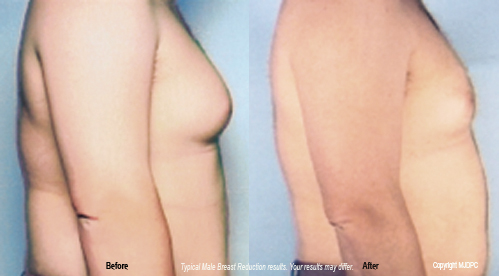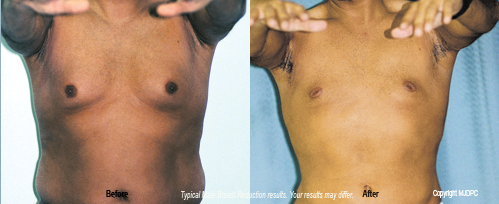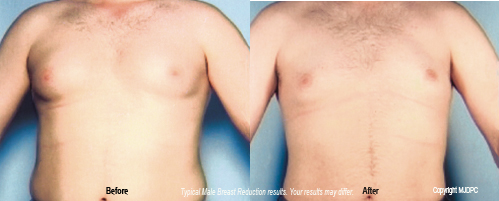In today's competitive job market, it's important to look your best. More and more men are electing to have cosmetic surgery, a trend that studies have shown is tied to career advancement.
One study revealed that 84% of men surveyed believed that physical attractiveness was important for power and success on the job.
Gynecomastia, a medical word from the Greek words for "woman-like breasts," affects one out of every ten men. Enlarged breasts on young boys last only a few years and are generally resolved by age eighteen. Enlarged breasts on a man can be uncomfortable, as well as socially and psychologically devastating.
Gynecomastia may be associated with obesity, hormonal metabolism imbalance, liver disease or medicinal causes. Prior to choosing a surgical solution to gynecomastia, a period of diet and exercise is recommended. Should that fail, male breast reduction is performed by our doctor for patients in our region to treat this condition.

Is male breast reduction surgery for you?
During your conference with Dr. Messa, he will explain your goals and expectations of the surgery. Dr. Messa will assess the nature of your breasts and the elasticity of your skin to determine the cause of your breast enlargement. It may be caused by fatty tissue and/or glandular tissue.
Dr. Messa may show you several before and after treatment photographs of patients having similar breasts. He will explain the treatment you can expect to receive and the surgical outcome you should anticipate.

The male breast reduction procedures
Male breast reduction is performed on an outpatient basis using a general anesthesia. The procedure can last from 1 - 3 hours depending on the extent of correction.
Liposuction for male breast reduction
If your gynecomastia is primarily caused by fatty tissue, liposuction is usually the procedure of choice. Liposuction surgery is a procedure used to actually remove unwanted localized deposits of fat cells from the body. A straw-like cannula is inserted through a tiny incision placed in an inconspicuous location on the skin. Using a vacuum system attached to the cannula, excess fat cells are sucked out. The result is a resculpting of bulging breasts into more attractive contours.

Traditional Surgical Excision for male breast reduction
If your gynecomastia is the result of a glandular disorder, liposuction alone is not likely to be adequate. Traditional surgical excision may be a better option.
The excision may be performed alone or in conjunction with liposuction. Typically, the incision is placed on the edge of the areola (colored area of the nipple) or in the underarm area. Dr. Messa will work through these incisions to cut away the excess glandular tissue, fat and skin from the breast. If your reduction requires the removal of significant amounts of tissue, larger incisions may be required.
If your gynecomastia is extreme, and large amounts of fat and/or glandular tissue have to be removed, excess skin may also have to be excised.
What is recovery from male breast reduction surgery like?
After Dr. Messa performs male breast reduction, bed rest is recommended for the first day. You will experience some pain for several days. For the first few days following your surgery, you will wear surgical dressings which will be exchanged for a special compression garment. This will be worn for about two weeks. Most discomfort associated with breast surgery can be controlled with oral medication prescribed by your surgeon. Antibiotics may also be prescribed. Most men experience some degree of swelling, bruising and tenderness. These symptoms should subside in a short time. Within about 2 weeks, all sutures are removed. Dr. Messa will advise you on a proper schedule for returning to your normal activities. Most patients are back to work within the first week.
Following your breast reduction surgery, you will enjoy a new, more pleasing shape. Many of our patients say their surgery enhanced their self-confidence.